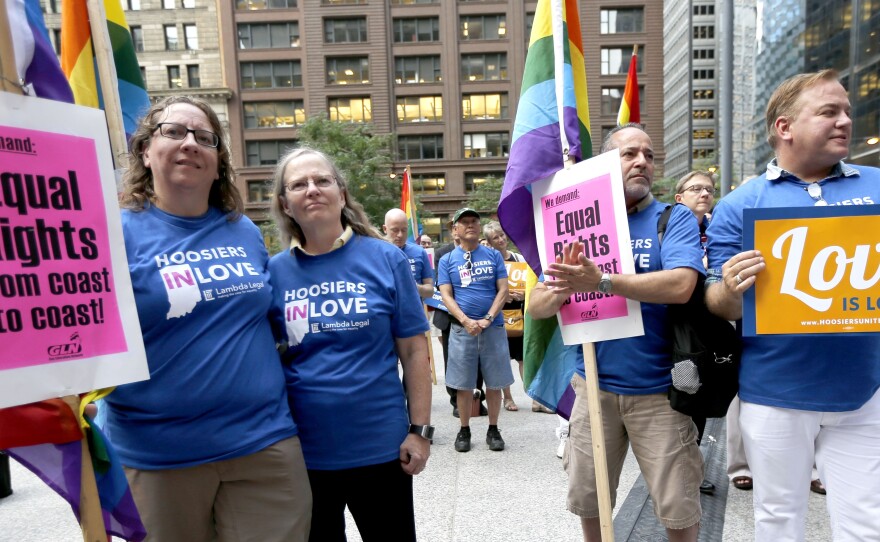The U.S. Court of Appeals covering much of the Midwest has become the third federal appeals court to strike down gay marriage bans — this time in Wisconsin and Indiana.
Writing for a unanimous three-judge panel, Judge Richard Posner, a Reagan appointee, said that Wisconsin and Indiana had given the court "no reasonable basis" for forbidding same-sex marriage. Indeed, he said, "The only rationale that the states put forward with any conviction is ... so full of holes that it cannot be taken seriously."
Two other federal appeals courts have reached similar conclusions: the 10th Circuit, which struck down gay marriage bans in Utah and Oklahoma, and the 4th Circuit, which struck down Virginia's ban on same-sex marriage. All three cases are being appealed to the U.S. Supreme Court, which is widely expected to take on the issue before the end of its current term in June.
As to the Indiana and Wisconsin cases decided on Thursday, Judge Posner wrote that at their "deepest level" they are about "the welfare of American children." The argument that the states "press hardest," he noted, is that they "seek to encourage marriage" between a man and a woman as a way of protecting children who can be the product of accidental pregnancies. And, he said, states argue if the biological parents aren't married, the children are often abandoned to a single parent or foster care. "Overlooked by this argument," said Posner, is that many of those children are adopted by homosexual couples, and "would be better off both emotionally and economically if their adoptive parents were married."
The tone of Posner's opinion was almost as scathing as his questions were just 10 days ago when the two cases were argued. Indiana's government thinks that straight couples tend to be sexually irresponsible, producing unwanted children by the carload, and so must be "pressured" by government encouragement to marry, he said in Thursday's opinion, but gay couples, unable to produce children, "are model parents ... so have no need for marriage." Or put another way, said Posner, the states' position is that "heterosexuals get drunk and pregnant, producing unwanted children," and their "reward is to be allowed to marry," while homosexual couples do not produce unwanted children, and their "reward is to be denied the right to marry. Go figure."
Piling on, he said that the states' "claim that conventional marriage is the solution to the problem of accidental pregnancies" is "belied by" the empirical data on out-of-wedlock births. If the states' policy of channeling accidental births into marriage were working, said Posner, one would expect a drop in the number of these births. But the evidence is to the contrary. In 1997, the year Indiana enacted its ban on gay marriage, the out-of-wedlock birth rate was 33 percent; in 2012, the most recent year for which there are statistics, that number had grown to 43 percent. In Wisconsin, those numbers were 28 percent and 37 percent.
Posner also rejected the states' argument that the ban on same-sex marriage helped to foster a centuries-old tradition of marriage as between a man and a woman. That argument, he said, "runs head on" into the Supreme Court's 1967 decision striking down a ban on interracial marriage. "Tradition," he said, "cannot be a lawful ground for discrimination — regardless of the age of the tradition."
"Obviously many people are distressed by the idea or reality" of same-sex marriage, said Posner. But mere distress is not enough to justify the ban on gay marriage.
Joining Posner's opinion were Judge Ann Claire Williams, named to the appeals court by President Clinton, and Judge David Hamilton, named to the appeals court by President Obama.
Copyright 2014 NPR. To see more, visit http://www.npr.org/.






